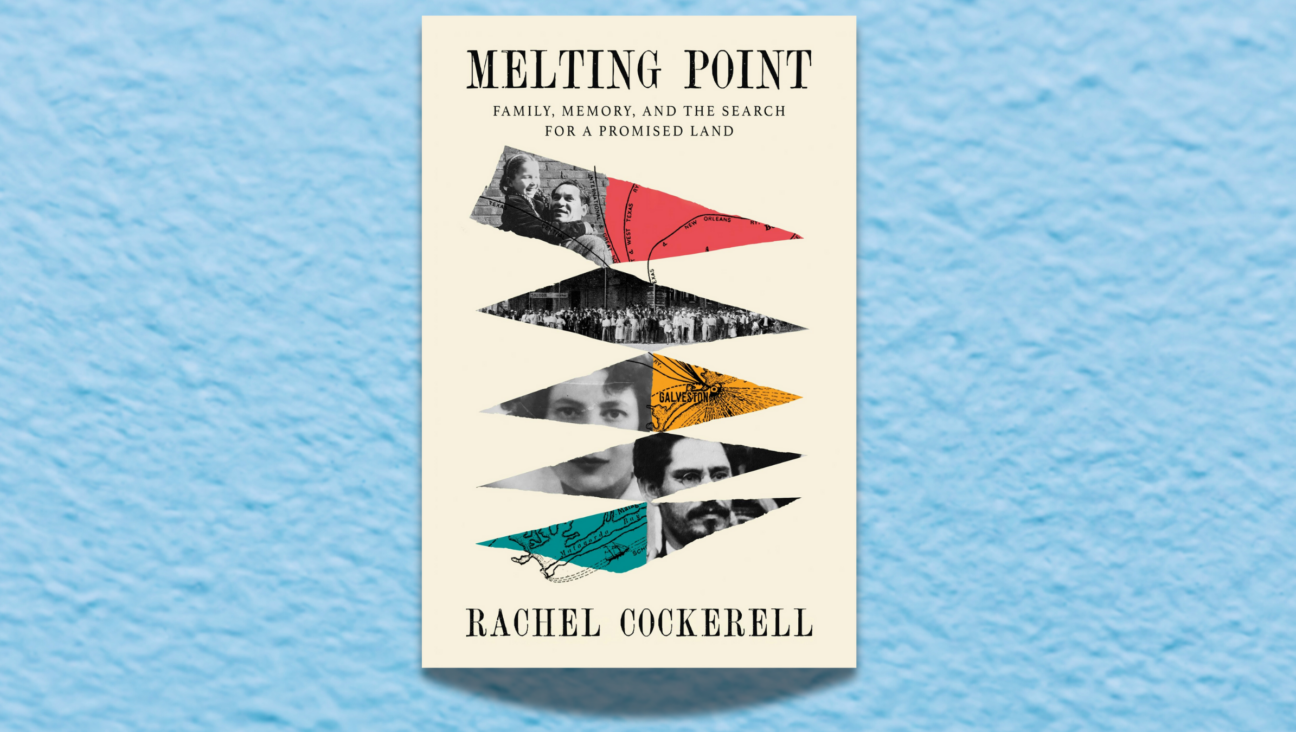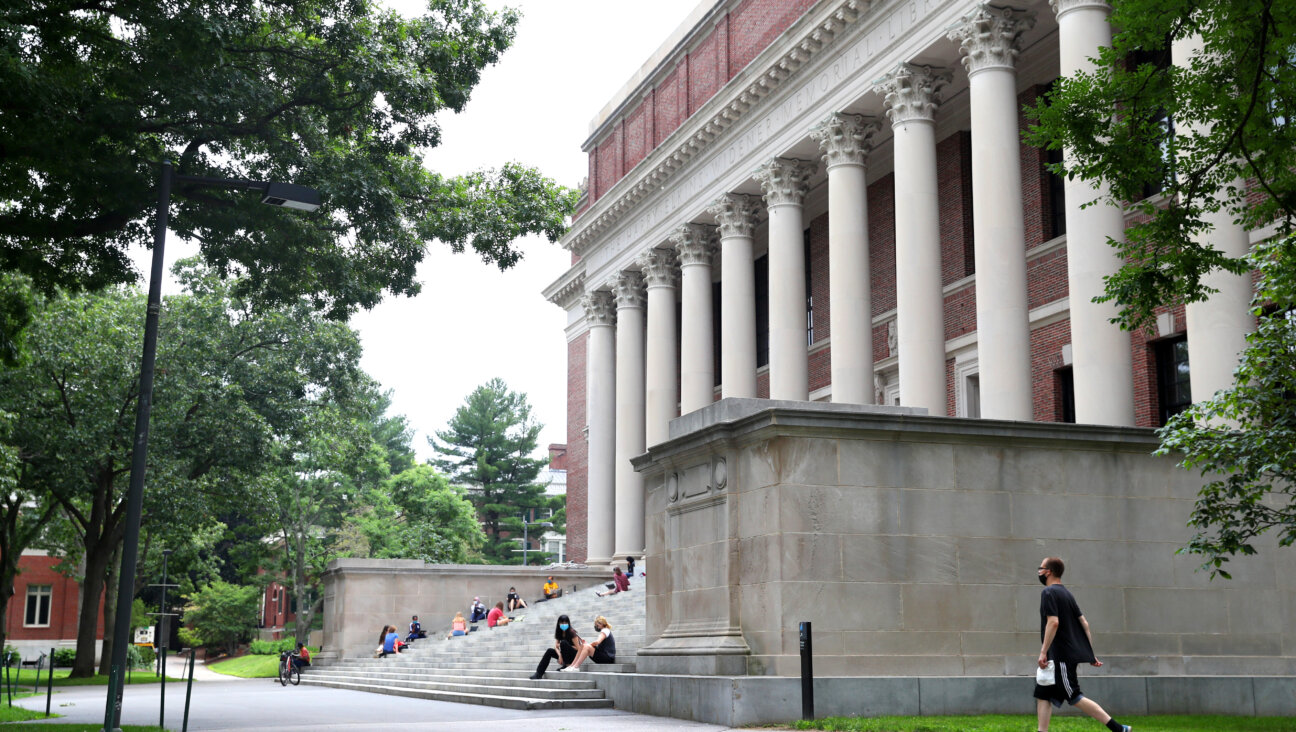Immigration Tiff in Israel Splits Justices
Israeli law contains no provision “by which constitutional human rights give way in a time of war,” even in a time of fighting terror, Israeli Chief Justice Aharon Barak wrote this week — taking his stand on one of the critical legal issues in Israel today. Barak’s statement was part of a Supreme Court decision on a law barring the naturalization of Palestinians who marry Israelis.
Forthright as Barak’s declaration might seem, however, the court’s overall ruling was far murkier. Six out of 11 justices agreed that the law was too sweeping, violating Israeli Arabs’ rights to marry and to equality. And yet, because a swing justice carefully straddled the issues, the court also voted, 6 to 5, to leave the law in force for now.
What’s more, by concentrating on the security question, the court arguably evaded dealing with an even more difficult problem raised by the law: whether protecting Israel’s Jewish majority justifies infringing on the Arab minority’s civil rights. In other words, what comes first, being a Jewish state or being a democratic one?
The Citizenship and Entry Into Israel Law was first passed by the Knesset as a one-year emergency measure in 2003, and has since been extended several times. The law applies only to West Bank and Gaza Palestinians, blocking the usual process by which a noncitizen who marries an Israeli becomes a temporary resident and, after five years, a citizen. The law’s official explanation stated that after the second intifada broke out in 2000, terror groups recruited Palestinians who had gained Israeli identification cards to help carry out terror attacks.
With rare exceptions, the Israelis who wed Palestinians are Arab. Such marriages are natural: During the long years when official policy was to make the line between Israel and the territories invisible, to integrate the two economies and to let Palestinians work inside Israel, social ties between Israeli and Palestinian Arabs expanded. Mixed couples took up residence on both sides of the line. More recently, with the economy in the territories deteriorating and travel to Israel sharply restricted, such couples are much more likely to live on the Israeli side. Palestinian spouses who can’t gain residency face the constant risk of expulsion.
Challenging the law, civil rights organizations argue that it violates the Israeli spouse’s right to create a family and that it discriminates against Israeli Arabs as a group. Attorney Orna Kohn of Adalah, an Israeli Arab rights center that filed a suit, estimates that “several thousand” families have been put in limbo by the law, with some husbands and wives forced to live apart from their spouses and children. In response to the legal challenge, the law was softened last summer when it was renewed. It now gives the interior minister discretion to naturalize men over 35 and women over 25 — considered much lower terror risks.
The Supreme Court’s long-delayed decision, rendered May 14, pitted two legal titans against each other. Chief Justice Barak, due to retire later this year, is a controversial judicial activist who has sought to extend the court’s reach — especially by giving wide meaning to the Basic Law: Human Dignity and Freedom, a Knesset-passed bill of rights that has constitutional status. In his lengthy opinion, Barak argued that “the additional security produced by the sweeping ban” on Palestinians “is not proportionate to the added damage to the family life and equality of the Israeli spouses.” To balance security and rights, he said, the state needed to screen applicants for naturalization individually. The law, he said, should be overturned.
Against Barak stood Mishael Cheshin, deputy chief justice, rendering his final judgment before mandatory retirement. Cheshin rejected Barak’s view that a citizen has the constitutional right to bring a noncitizen spouse into the country, stressing that a nation can bar immigration of enemy aliens. And, he stressed, “The state of Israel, as we all know, is at war — or at the least, near war — with the Palestinian Authority and the terror organizations operating from it.” He wrote that since Hamas’s electoral victory in January, “Hamas and the Palestinian Authority… have become one and the same.” The law, therefore, could stand.
Since four justices agreed with Barak and four with Cheshin, the crucial vote was cast by Edmond Levy, an Orthodox justice known for his frequent dissents. Levy asserted that the law harms “not only couples wishing to marry, but also the democratic character of the State of Israel and the delicate fabric of relations with a not insignificant community living within it.” The state, he wrote, must institute individual screening instead.
But Levy, preferring judicial restraint, gave the state nine months to change procedures. He let the law stand in the meantime.
In practical terms, that meant defeat for the rights groups and families that they represented, while tossing the issue back into the lap of the Knesset and the Cabinet.
Reactions were swift. “This is really a racist decision. They’ve shown us we are second-class citizens, or third class,” said Ranit Tabilah of the Galilee Arab town of Shfaram. Her husband, Hatem, is from Nablus in the West Bank. Hatem, an electrician, was legally working for an Israeli firm when he met Ranit in 1999. They married the following year and now have two daughters, ages 5 and 3. Hatem received temporary residency before the citizenship law was enacted, but his status expires in November and he will only turn 35. He won’t be eligible to reapply until mid 2007. “He’s not interested in politics,” said Ranit, a vocational college teacher. “If they thought he was a security threat, they wouldn’t have given him a [work] permit before we were married.”
“This is one of the most disappointing decisions ever handed down by the court,” said Dan Yakir, chief legal counsel for the Association for Civil Rights in Israel. ACRI also challenged the law. “It’s clear,” Yakir added, “that the security issue was only a thin veil over the demographic issue”: the desire to maintain a Jewish majority by preventing more Arabs from becoming citizens.
In contrast, prominent legal scholar Amnon Rubinstein — a former Knesset member for the left-wing Meretz party — publicly defended the court’s ruling. Rubinstein, now president of the Interdisciplinary Center in Herzliyah and chair of a government-appointed panel on immigration policy, said that a country has the right to prevent immigration from a hostile entity. The law, he said, should be amended to refer to a state of war rather than singling out residents of a particular territory. Indeed, in the wake of the ruling, Justice Minister Haim Ramon said he would submit a comprehensive immigration bill in the form of a Basic Law, giving it constitutional status and putting it outside of the court’s reach.
The common denominator of those responses is that Israel faces an immigration issue, not just one of security. The last major Knesset debate on immigration was in 1970, when parliament defined the word “Jew” in the Law of Return and extended immigration rights to non-Jewish children and to grandchildren of Jews. Israel was a poor country then; the thought that it would one day draw economic migrants was unimaginable. Moreover, the problem of maintaining a Jewish majority was raised back then only by the most dovish opponents of keeping the occupied territories.
Since the 1990s, though, emigration from the former Soviet Union has brought hundreds of thousands of non-Jews who are eligible for citizenship, by marriage or by Jewish ancestry, under the Law of Return. Israel’s leap to a European-level economy also has attracted foreign workers — perhaps better termed “undocumented immigrants” — and some have been here for years and have raised children who know no other country but lack citizenship.
But while those groups are likely to speak Hebrew and to seek integration into Israel’s Jewish majority, Palestinian immigrants nearly always join the Arab minority. Ironically, the same sudden concern with demography that has pushed many rightists to accept the idea of ceding territory has translated into desire to keep Palestinians from gaining citizenship.
In the Supreme Court ruling, only one justice, Ayala Procaccia, called attention to that obvious political reality. In the Knesset debate on the Citizenship Law, Procaccia wrote, “the demographic issue hovered over the entire legislative process.” She noted that during the debate, two leading Likud figures, Reuven Rivlin, then Knesset speaker, and Gideon Ezra, now Kadima’s minister of the environment, warned that Palestinians were using family unification as a means to implement a “right of return” to pre-1967 Israel. Other Knesset members said that the law would stop the “demographic danger.”
While acknowledging genuine security concerns, Procaccia suggested that their force was lessened by the other issue looming in the background, namely demography. And demography, she implied, could not justify impinging on Arab citizens’ rights.
Procaccia sided with Barak. Yet the chief justice himself accepted the state’s argument that the law was designed solely for security reasons and not demographic ones. Barak thereby sidestepped the demographic question.
Judges “are afraid of questions like that,” leading legal commentator Moshe Negbi said. “It’s a frightening business, because all of us, as people who live here and believe in this country, want to hope that it’s possible to sustain a Jewish democratic state. And these questions arouse the fear that maybe that’s not true. People prefer to repress them. It’s psychological.”
Yet the court’s own decision makes those questions impossible to push aside. Now the politicians must change the law or abandon it. Despite Ramon’s declaration, a bill with constitutional status stands little chance. Regular legislation easily could spark new requests for the court to intervene. Barak and Cheshin will be gone, and other justices will have their turn to try to be forthright.
The Forward is free to read, but it isn’t free to produce

I hope you appreciated this article. Before you go, I’d like to ask you to please support the Forward.
Now more than ever, American Jews need independent news they can trust, with reporting driven by truth, not ideology. We serve you, not any ideological agenda.
At a time when other newsrooms are closing or cutting back, the Forward has removed its paywall and invested additional resources to report on the ground from Israel and around the U.S. on the impact of the war, rising antisemitism and polarized discourse.
This is a great time to support independent Jewish journalism you rely on. Make a Passover gift today!
— Rachel Fishman Feddersen, Publisher and CEO
Most Popular
- 1

News Student protesters being deported are not ‘martyrs and heroes,’ says former antisemitism envoy
- 2

Opinion My Jewish moms group ousted me because I work for J Street. Is this what communal life has come to?
- 3

News Who is Alan Garber, the Jewish Harvard president who stood up to Trump over antisemitism?
- 4

Fast Forward Suspected arsonist intended to beat Gov. Josh Shapiro with a sledgehammer, investigators say
In Case You Missed It
-

Books What is ‘Zionism without Zion?’ New history asks, but can’t answer
-

Fast Forward Shapiro recites Priestly Blessing given to him by fire chaplain after Passover arson
-

Opinion Israel just threw another wrench in the peace process — and possibly doomed the last hostages
-

Culture In the new Fantastic Four trailer, a glimpse of Yancy Street’s Yiddishkeit
-
Shop the Forward Store
100% of profits support our journalism
Republish This Story
Please read before republishing
We’re happy to make this story available to republish for free, unless it originated with JTA, Haaretz or another publication (as indicated on the article) and as long as you follow our guidelines.
You must comply with the following:
- Credit the Forward
- Retain our pixel
- Preserve our canonical link in Google search
- Add a noindex tag in Google search
See our full guidelines for more information, and this guide for detail about canonical URLs.
To republish, copy the HTML by clicking on the yellow button to the right; it includes our tracking pixel, all paragraph styles and hyperlinks, the author byline and credit to the Forward. It does not include images; to avoid copyright violations, you must add them manually, following our guidelines. Please email us at [email protected], subject line “republish,” with any questions or to let us know what stories you’re picking up.











